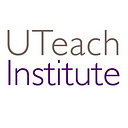UTeach Computer Science Principles and Underrepresented Students
by Michael Marder, Executive Director of UTeach and Professor in the Department of Physics, University of Texas at Austin
The AP® Computer Science scores of underrepresented students who took UTeach CS Principles were significantly better than national averages. This remains true after controlling for the demographic composition of the schools using the UTeach curriculum.
In the Spring 2017 administration of the Advanced Placement® Computer Science Principles exam, classrooms that made use of the UTeach CSP curriculum did well. Overall, 82.8% passed versus 74% nationally. In addition, 70% of Hispanic students who took the exam passed versus 57% nationally, 55% of Black students passed versus 42% nationally, and 82% of women passed versus 70% nationally.
I carried out an analysis—technical details are here—and results appear in the table below. The answer is that uncertainties due to sampling are too small to explain the difference between the UTeach results and those of the national sample. Students in UTeach CSP schools are economically disadvantaged by roughly 10 fewer percentage points than students of the same racial/ethnic group in U.S. schools. Calculations say this should be expected to produce a 1% to 4% increase in students passing the AP® CS Principles exam. However, the actual performance of students in the UTeach CS Principles course was significantly better than this.
Thus, although there were effects from students’ economic status, race, and ethnicity, the data suggest that the favorable exam results for students taking UTeach CS Principles were due to the quality of teacher professional development, support, and curriculum.
